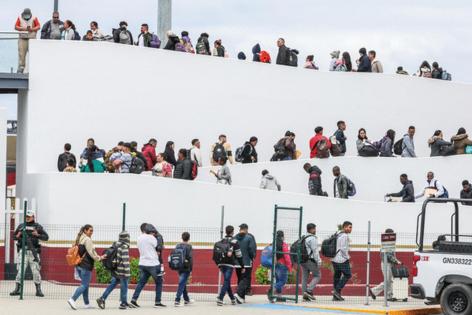Commentary: The high cost of escaping torture
Published in Op Eds
By now, Americans have become familiar with seeing masked federal agents snatching people off the street and outside courthouses. Separations of families of asylum seekers and other non-citizens, and occasionally even citizens, are all part of the malevolence of U.S. immigration policy.
But far less attention has gone to another measure that makes desperate and endangered people more vulnerable — the fees they must pay to get through the asylum process.
Among the many harms of President Donald Trump’s “One Big Beautiful Bill Act” was the imposition of substantial new fees for applying for asylum, applying for permission to work while seeking asylum, filing a notice to appeal an immigration court decision and many other elements of the process.
The new fees are unaffordable to many asylum seekers. Applying for asylum, which was previously free, now costs $100 at the time of application and $100 for each year that the applicant awaits their asylum decision, which can take quite a few years. In addition, the $550 work permit fee is a cruel catch-22 for people who cannot work in the United States without one. (Previously, the application fee for a work permit could sometimes be waived if the applicant was in a state-provided shelter or was otherwise receiving public benefits) For those who are denied asylum, even wrongfully, the $1,010 fee required to notify the immigration court system of the intention to appeal a decision is beyond the reach of many asylum seekers.
As a volunteer with nonprofit groups that work with asylum seekers, I have seen how desperately they strive to come up with fees that may mean the difference between life and death. It has been heart-breaking to meet asylum-seekers who had good jobs — nurses, bookkeepers, drivers — in their home countries but now are desperate for any work they can get, however risky or unauthorized.
Indeed, having to raise funds for fees makes it more likely that asylum seekers will pursue the kinds of informal employment, such as the day labor jobs frequently sought in Home Depot parking lots, that make them visible and vulnerable to arrest.
The new fees compound the challenge asylum seekers already face to find affordable legal assistance, which is critical in navigating the difficult process of seeking asylum. Having a lawyer makes it more likely that judges will allow online rather than in-person hearings, which protects them from being grabbed outside a courtroom by armed federal agents.
“It just feels like people are being cornered from every angle,” Robin Nice, an immigration attorney in Boston, told Politico last month. “It’s hard to know if it’s weaponized incompetence in how they’re rolling it out, or if it’s straight up malicious … but it’s really hard to advise clients.”
Despite the often heroic efforts of nonprofits to provide free legal assistance, pro bono immigration lawyers are in short supply. Their small organizations, sometimes affiliated with religious and community centers, often work on a shoestring budget, lacking the funds to help those blocked from the asylum process because they can’t afford the fees.
The justification for these fees is unclear. In a recent court filing, Justice Department lawyers called them “long overdue and necessary to recover the growing costs of adjudicating the millions of pending asylum applications.” But in practice, it’s difficult to understand the new fees as anything other than a way to make it harder for people who are literally running for their lives.
The asylum seekers I’ve known are fleeing various forms of persecution, including torture, religious or ethnic discrimination, political repression, domestic violence, homophobia and forced marriage. They don’t need the government to make it harder for them to exercise their right to seek asylum under U.S. and international law.
Asylum services are scrambling to set up GoFundMe sites or otherwise find financial support for those not able to pay the fees. People interested in doing something to address the inhumanity of U.S. immigration policy and practices can give money to organizations facing this challenge, such as the Asylum Support Clinic or El Barrio Angels in New York. And everyone should do what they can to make the cruelty of Trump’s immigration policy an election issue.
____
Joanne Csete is a retired professor of public health at Columbia University. She has volunteered at asylum services in New York and San Diego for three years. This column was produced for Progressive Perspectives, a project of The Progressive magazine, and distributed by Tribune News Service.
_____
©2025 Tribune Content Agency, LLC.
























































Comments